Events and Activities
New issue of Contemporary Japan published
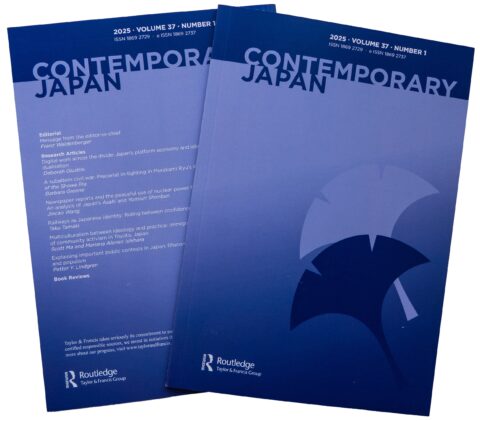 The new issue of Contemporary Japan includes research articles on new forms of labor market dualization in the platform economy (Deborah Giustini), an analysis of Murakami Ryu’s Popular Hits of the Showa Era from the perspective of precarity (Barbara Greene), a discussion of media discourses of the peaceful use of nuclear power in the early postwar period (Jincao Wang), an analysis of Japanese identity construction through railway technology (Taku Tamaki), narratives of multiculturalism and community-building among Nikkei in the city of Toyota (Scott Ma and Mariana Alonso Ishihara), and an assessment of political rhetoric, public contest outcomes, and populism in 21st century Japanese politics (Petter Lindgren). The book review section covers publications on Jesuit enterprise in Japan in the sixteenth and seventeenth centuries, on the impact of the bombings of Hiroshima and Nagasaki on psychological science, on East-West encounters in Japanese art, and on the history of the Japanese business community in Düsseldorf.
The new issue of Contemporary Japan includes research articles on new forms of labor market dualization in the platform economy (Deborah Giustini), an analysis of Murakami Ryu’s Popular Hits of the Showa Era from the perspective of precarity (Barbara Greene), a discussion of media discourses of the peaceful use of nuclear power in the early postwar period (Jincao Wang), an analysis of Japanese identity construction through railway technology (Taku Tamaki), narratives of multiculturalism and community-building among Nikkei in the city of Toyota (Scott Ma and Mariana Alonso Ishihara), and an assessment of political rhetoric, public contest outcomes, and populism in 21st century Japanese politics (Petter Lindgren). The book review section covers publications on Jesuit enterprise in Japan in the sixteenth and seventeenth centuries, on the impact of the bombings of Hiroshima and Nagasaki on psychological science, on East-West encounters in Japanese art, and on the history of the Japanese business community in Düsseldorf.
Blindness as disability: New book chapter by Carolin Fleischer-Heininger analyses novel by Gunji Nanae
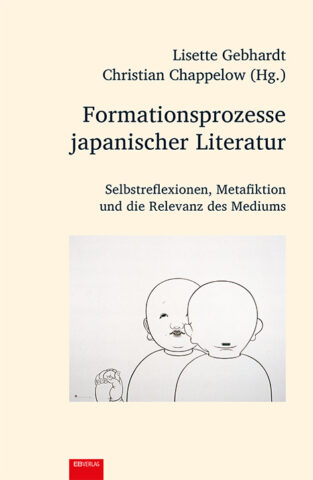
DIJ researcher Carolin Fleischer-Heininger‘s latest publication “Perspektiven auf Blindheit in Beruna no shippo (1996) von Gunji Nanae” studies the discussion of blindness as a disability in Gunji’s autobiographical novel Beruna no shippo. A close reading, taking into account theories from Disability Studies, shows that the novel is aimed at a general public that promotes guide dogs. At the same time, the novel portrays blindness – in particular with regard to mobility and motherhood – as a difference and as a deficit. Carolin’s analysis is preceded by an introductory section on the author, the novel, and the context in which it was written and received. It also includes comments on blindness as a disability in Japan and in Japanese literature as well as a review of related research. Her chapter was published in Formationsprozesse japanischer Literatur: Selbstreflexionen, Metafiktion und die Relevanz des Mediums (EB-Verlag 2025), edited by Lisette Gebhardt and Christian Chappelow.
Franz Waldenberger and Barbara Holthus in German radio feature on poverty in Japan
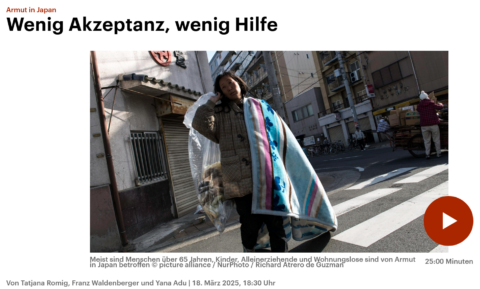 Weak Yen and high inflation: as a consequence, poverty is spreading in Japan, a country previously known as ‘middle class society’. For the radio feature “Armut in Japan: Wenig Akzeptanz, wenig Hilfe”, Deutschlandfunk Kultur interviewed DIJ director Franz Waldenberger and deputy director Barbara Holthus about the causes of poverty in Japan and countermeasures taken by society and politics. Elderly people, children, and single mothers are particularly vulnerable to slip below the poverty line. According to Holthus, one reason is the lack of social security for people working part-time. However, poverty is not a major issue in Japanese politics, Waldenberger explains. “Because there is little pressure from the population on the government, poverty is not much discussed in the public and not a priority for Prime Minister Ishiba’s government”. The radio feature (in German), part of Deutschlandfunk’s Weltzeit series, is available here.
Weak Yen and high inflation: as a consequence, poverty is spreading in Japan, a country previously known as ‘middle class society’. For the radio feature “Armut in Japan: Wenig Akzeptanz, wenig Hilfe”, Deutschlandfunk Kultur interviewed DIJ director Franz Waldenberger and deputy director Barbara Holthus about the causes of poverty in Japan and countermeasures taken by society and politics. Elderly people, children, and single mothers are particularly vulnerable to slip below the poverty line. According to Holthus, one reason is the lack of social security for people working part-time. However, poverty is not a major issue in Japanese politics, Waldenberger explains. “Because there is little pressure from the population on the government, poverty is not much discussed in the public and not a priority for Prime Minister Ishiba’s government”. The radio feature (in German), part of Deutschlandfunk’s Weltzeit series, is available here.
Hybrid DIJ Forum on German and Japanese Economies
 A rapidly ageing population, global warming, digitalization and AI, heightened geopolitical risks and a U.S.-induced tariff war – entering 2025, the German and Japanese economies confront an increasingly challenging as well as uncertain economic environment. How do they confront the fundamental domestic and international challenges? What possible scenarios do they envisage? These and related questions will be addressed by two leading economic scholars, Monika Schnitzer (German Council of Economic Experts) and Noriyuki Yanagawa (Council on Economic and Fiscal Policy). Their input statements will be followed by comments from two Japanese corporate leaders, Osamu Mogi (Kikkoman Corporation) and Makoto Shiono (Industrial Growth Platform) before the floor will be opened to questions from the general audience. The event will be held in English, admission is free. It is co-organised with Japan Association of Corporate Executives and will be followed by a small reception. Details and registration here
A rapidly ageing population, global warming, digitalization and AI, heightened geopolitical risks and a U.S.-induced tariff war – entering 2025, the German and Japanese economies confront an increasingly challenging as well as uncertain economic environment. How do they confront the fundamental domestic and international challenges? What possible scenarios do they envisage? These and related questions will be addressed by two leading economic scholars, Monika Schnitzer (German Council of Economic Experts) and Noriyuki Yanagawa (Council on Economic and Fiscal Policy). Their input statements will be followed by comments from two Japanese corporate leaders, Osamu Mogi (Kikkoman Corporation) and Makoto Shiono (Industrial Growth Platform) before the floor will be opened to questions from the general audience. The event will be held in English, admission is free. It is co-organised with Japan Association of Corporate Executives and will be followed by a small reception. Details and registration here
Noriyuki Yanagawa, Council on Economic and Fiscal Policy
Open access article co-authored by Sébastien Lechevalier studies impact of digitalization on job satisfaction
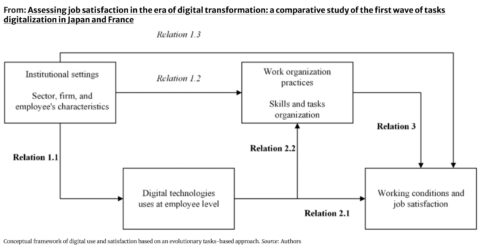 A new open access paper, co-authored by DIJ’s Sébastien Lechevalier and Malo Mofakhami analyses the diverse effects of the first wave of digitalization on job satisfaction through a comparison between Japan and France. The study neither finds substantial differences between the two countries regarding the impact of digital use on work organization practices nor a direct effect of digital use on job satisfaction. However, digital use is correlated to some work organization practices, such as autonomy, flexibility, and learning, through which it has positive mediated effects. The major source of the digital divide, in terms of satisfaction, is, in both countries, related to the perceived absence of digital skills by some workers. “Assessing job satisfaction in the era of digital transformation: a comparative study of the first wave of tasks digitalization in Japan and France” is published online first in the European Business Review (Springer).
A new open access paper, co-authored by DIJ’s Sébastien Lechevalier and Malo Mofakhami analyses the diverse effects of the first wave of digitalization on job satisfaction through a comparison between Japan and France. The study neither finds substantial differences between the two countries regarding the impact of digital use on work organization practices nor a direct effect of digital use on job satisfaction. However, digital use is correlated to some work organization practices, such as autonomy, flexibility, and learning, through which it has positive mediated effects. The major source of the digital divide, in terms of satisfaction, is, in both countries, related to the perceived absence of digital skills by some workers. “Assessing job satisfaction in the era of digital transformation: a comparative study of the first wave of tasks digitalization in Japan and France” is published online first in the European Business Review (Springer).
Book chapter by Carolin Fleischer-Heininger studies literary visions of the future
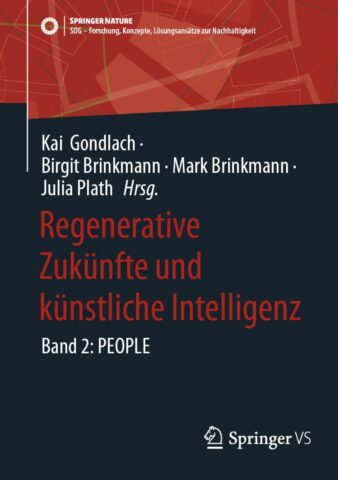
A new book chapter by DIJ researcher Carolin Fleischer-Heininger analyses the novel ‘Chiryō-tō’ (Therapy Station, 1990) by the Japanese Nobel Prize laureate Ōe Kenzaburō with regard to its two contrasting visions of the future. The first shows a technology-based, exclusive society of the ‘chosen’, the second an inclusive community of ‘failures’. Using the depiction of intellectual disability – particularly through the character of Hikari – the novel criticises destructive narratives of progress and creates a vision of a more humane society. The text is interpreted as a time-critical commentary on Japan’s affinity for technology and as a plea for more inclusion. Carolin’s chapter “Zwischen destruktivem Fortschritt und inklusiver Menschengerechtigkeit: Zukunftsentwürfe als Zeitkritik und Kompass in Chiryō-tō von Ōe Kenzaburō (1935–2023)” is published in the volume Regenerative Zukünfte und künstliche Intelligenz: SDG-Forschung, Konzepte, Lösungsansätze zur Nachhaltigkeit (SpringerVS 2024), co-edited by Kai Gondlach, Birgit Brinkmann, Mark Brinkmann, and Julia Plath.
Deutschsprachiges Kaffeekränzchen „Philosophie-Jause“
 Die Jause geht weiter! In Frankreich ist das café philosophique eine Veranstaltung zum Philosophieren, an der jede Person teilnehmen kann. Auch in Japan gibt es bereits ähnliche Programme auf dem Land. The University of Tokyo Center for Philosophy (UTCP) und das Deutsche Institut für Japanstudien (DIJ) organisieren nun gemeinsam ein philosophisches Café auch in Tokyo, allerdings mit einer kleinen Besonderheit: Wir möchten deutschsprachigen Personen die Möglichkeit des Austauschs bieten und daher das Café auf Deutsch abhalten. Das Organisationsteam (Yukiko Kuwayama, UTCP und Sebastian Polak-Rottmann, DIJ) freut sich, Sie einzuladen, gemeinsam in entspannter Atmosphäre über ein Thema zu diskutieren. Fachliche Vorkenntnisse benötigen Sie nicht. Das Diskussionsthema entscheiden wir gemeinsam vor Ort. Bei Interesse melden Sie sich bitte bis zum 28. März an. Weitere Informationen hier
Die Jause geht weiter! In Frankreich ist das café philosophique eine Veranstaltung zum Philosophieren, an der jede Person teilnehmen kann. Auch in Japan gibt es bereits ähnliche Programme auf dem Land. The University of Tokyo Center for Philosophy (UTCP) und das Deutsche Institut für Japanstudien (DIJ) organisieren nun gemeinsam ein philosophisches Café auch in Tokyo, allerdings mit einer kleinen Besonderheit: Wir möchten deutschsprachigen Personen die Möglichkeit des Austauschs bieten und daher das Café auf Deutsch abhalten. Das Organisationsteam (Yukiko Kuwayama, UTCP und Sebastian Polak-Rottmann, DIJ) freut sich, Sie einzuladen, gemeinsam in entspannter Atmosphäre über ein Thema zu diskutieren. Fachliche Vorkenntnisse benötigen Sie nicht. Das Diskussionsthema entscheiden wir gemeinsam vor Ort. Bei Interesse melden Sie sich bitte bis zum 28. März an. Weitere Informationen hier
Hybrid DIJ Study Group on the lived experiences of multilinguals in Japan
 Japan is experiencing a growing influx of international migrants. These individuals establish new social connections in both their private and professional lives, which often involves learning Japanese. However, Japanese is just one resource within a broader, multilingual repertoire. This presentation explores the lived experiences of multilingual individuals in Japan, focusing on two spheres that typically require distinct sets of communicative competences: romantic relationships and workplaces. Drawing on data from narrative interviews, our speaker will demonstrate how multilinguals rationalize their interactional partners’ behavior and attribute intentional states to them to make sense of their experiences and their implications for perceptions of language competence. He will argue that competence should be understood as an intersubjective capability that emerges in interactions between individuals, across time and spaces, and institutional contexts, all while being intertwined with emotional expressions. Details and registration here
Japan is experiencing a growing influx of international migrants. These individuals establish new social connections in both their private and professional lives, which often involves learning Japanese. However, Japanese is just one resource within a broader, multilingual repertoire. This presentation explores the lived experiences of multilingual individuals in Japan, focusing on two spheres that typically require distinct sets of communicative competences: romantic relationships and workplaces. Drawing on data from narrative interviews, our speaker will demonstrate how multilinguals rationalize their interactional partners’ behavior and attribute intentional states to them to make sense of their experiences and their implications for perceptions of language competence. He will argue that competence should be understood as an intersubjective capability that emerges in interactions between individuals, across time and spaces, and institutional contexts, all while being intertwined with emotional expressions. Details and registration here



 Open Access
Open Access
